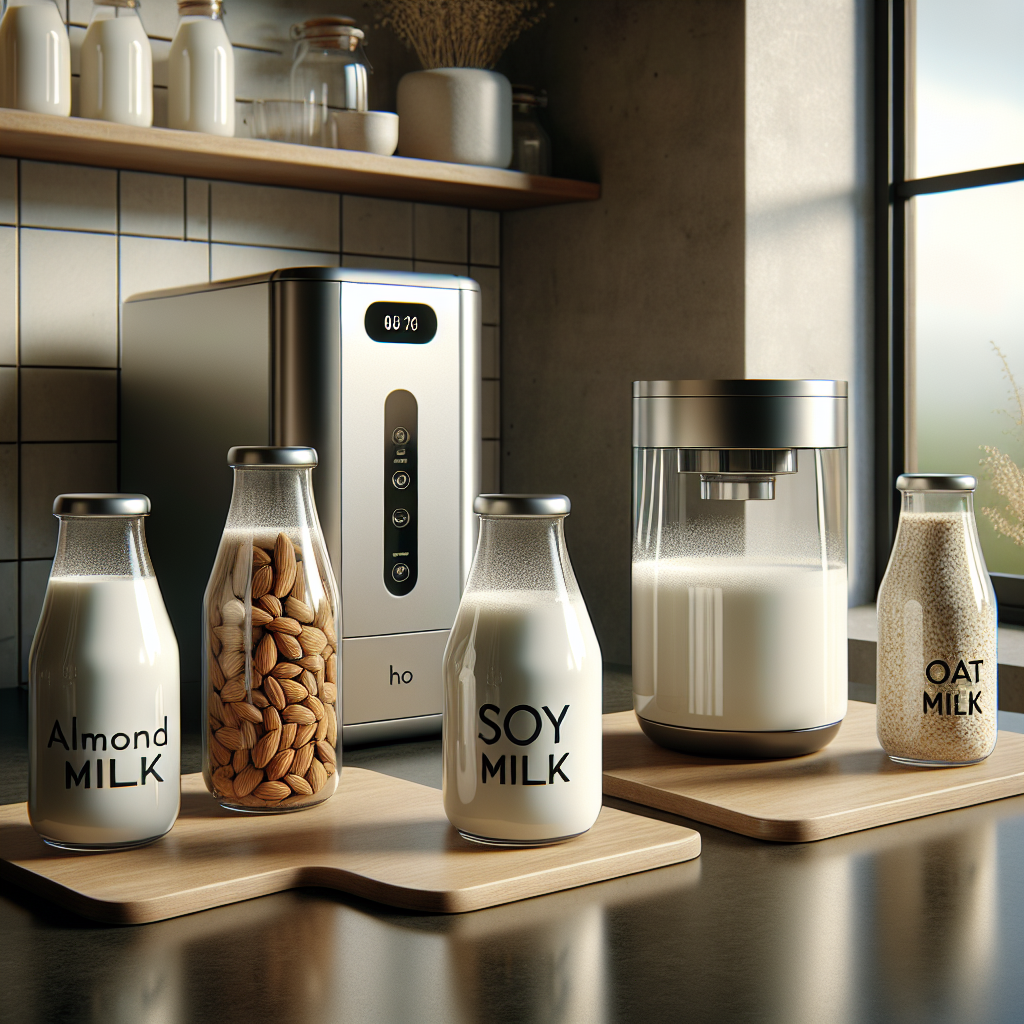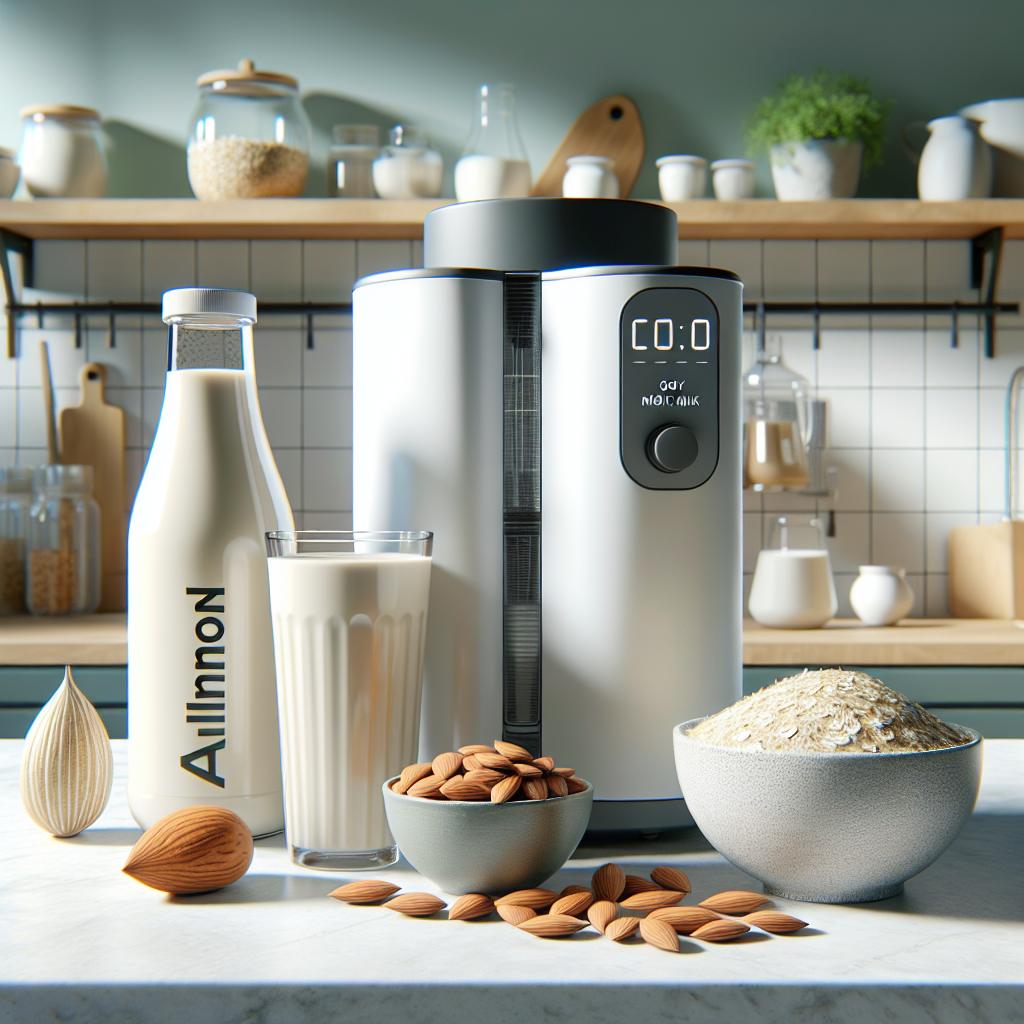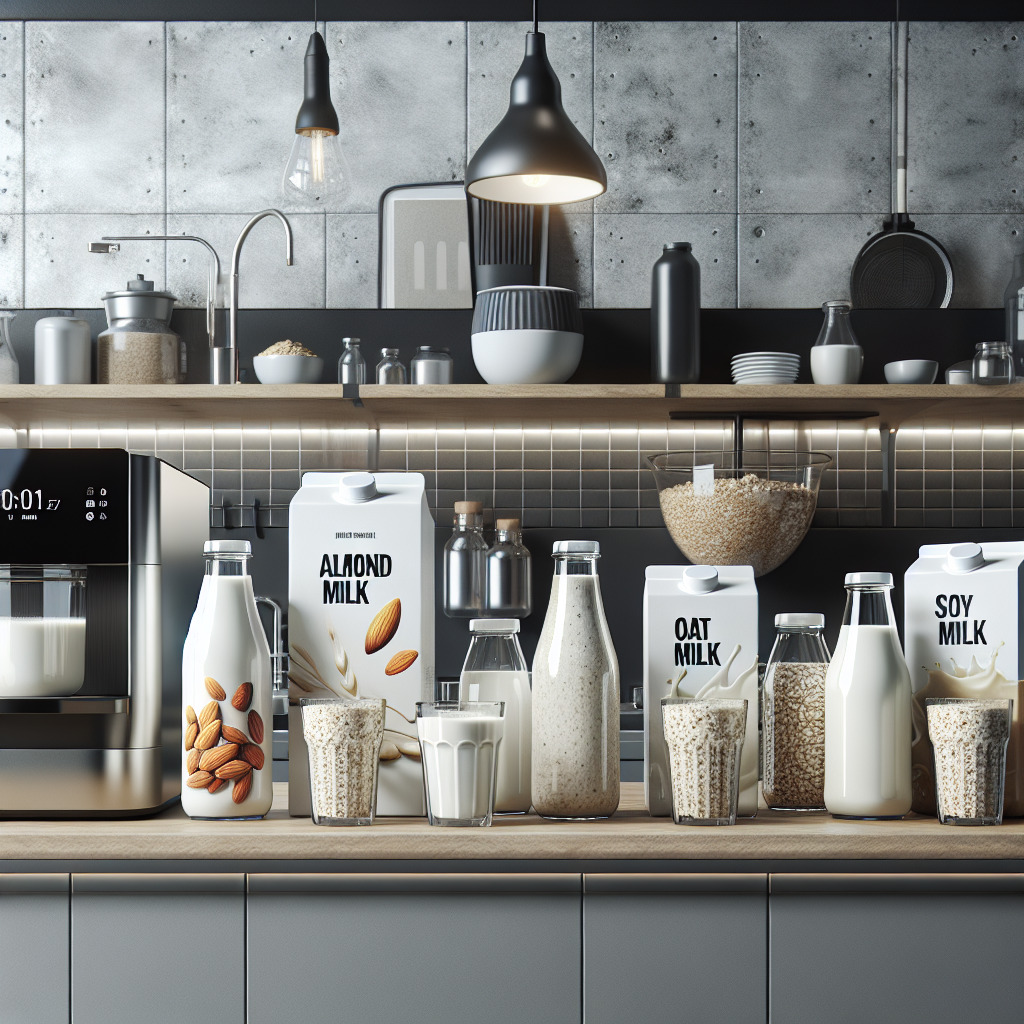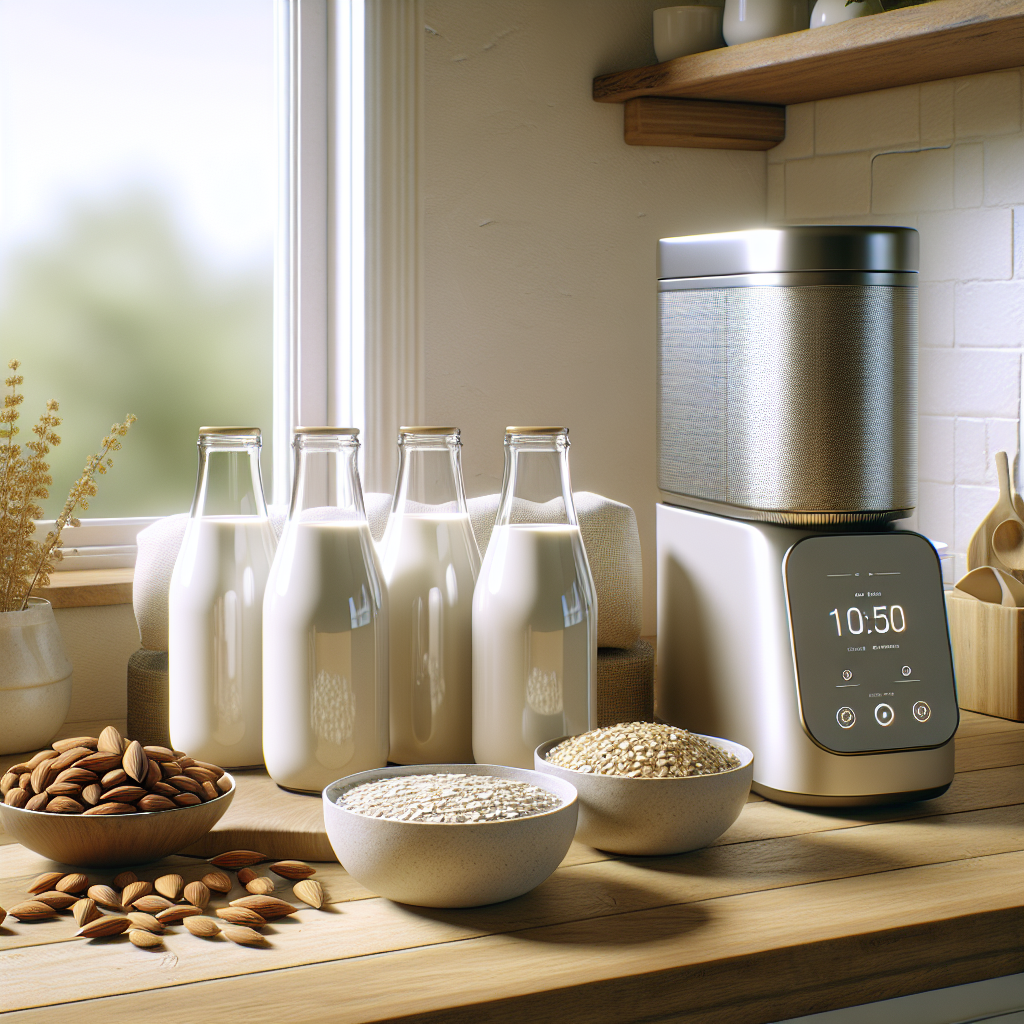In recent years, the demand for healthy and sustainable dairy substitutes has skyrocketed. Whether due to lactose intolerance, dietary preferences, or environmental concerns, more people are seeking alternatives to traditional cow's milk. Dairy substitutes not only offer a solution for those who cannot consume dairy but also provide a variety of flavors and nutritional benefits.
Among the most popular dairy substitutes are those derived from nuts, grains, and seeds. These alternatives are naturally lactose-free and often contain no additives or preservatives, making them a cleaner choice for your diet. With the rise of veganism and increased awareness of food allergies, the market for these substitutes has expanded significantly.
One of the most exciting developments in this field is the advent of home appliances capable of producing fresh, filtered milk from a variety of nuts, grains, and seeds in less than 60 seconds. This not only offers the convenience of making your own milk at home but also ensures that you know exactly what goes into your drink. Eco-friendly and economical, these appliances can save users up to 90% of the cost of store-bought milk.
Curious to try making your own dairy substitutes at home? Get yours today! Experience the joy of creating fresh, personalized milk with ease and confidence.
Health Benefits of Dairy Alternatives

Switching to dairy alternatives can offer a myriad of health benefits that go beyond merely avoiding lactose. These substitutes are often packed with essential nutrients that promote overall well-being. One of the key advantages is that they are generally lower in calories and fat compared to traditional cow's milk, making them an excellent choice for those looking to manage their weight.
Many dairy alternatives, such as almond milk and oat milk, are rich in vitamins and minerals. For instance, almond milk is a good source of vitamin E, which acts as an antioxidant that helps protect your cells from damage. Oat milk, on the other hand, is high in fiber, particularly beta-glucan, which can help lower cholesterol levels.
For individuals with specific dietary restrictions or allergies, dairy alternatives provide a safe and versatile option. Nut-based milks like cashew and macadamia contain healthy fats that support heart health, while seed-based options like hemp and flaxseed milk are rich in omega-3 fatty acids, which are essential for brain function and reducing inflammation.
Moreover, these alternatives are often fortified with additional nutrients such as calcium and vitamin D, ensuring that you don't miss out on the essential elements typically found in cow's milk. This makes them a well-rounded option for those looking to maintain a balanced diet.
By incorporating these substitutes into your daily routine, you can enjoy a variety of flavors and textures while reaping the health benefits that come with them. From boosting your nutrient intake to supporting a healthy lifestyle, dairy alternatives offer a compelling case for making the switch.
Popular Nut-Based Milk Options
Nut-based milk options have surged in popularity, owing to their rich flavors and impressive nutritional profiles. Among the most beloved varieties is almond milk. This dairy substitute is not only low in calories but also boasts a significant amount of vitamin E, an antioxidant that is beneficial for skin health and immune function. Its mildly sweet and nutty flavor makes it a versatile choice for both sweet and savory dishes.
Another favorite is cashew milk. Known for its creamy texture and subtle taste, cashew milk is packed with healthy fats, magnesium, and iron. These nutrients are essential for heart health, muscle function, and preventing anemia. Cashew milk is a fantastic addition to coffee, smoothies, and sauces, offering a luxurious creaminess that rivals traditional dairy.
Macadamia milk is another luxurious option that has been gaining traction. It is rich in monounsaturated fats, which are known to support heart health. Macadamia milk also contains manganese, a mineral crucial for bone health and metabolism. Its slightly buttery flavor profile makes it perfect for baking, adding a unique twist to your favorite recipes.
For those who crave variety, hazelnut milk is an excellent choice. With its distinct, robust flavor, hazelnut milk is often used in coffee and chocolate-based desserts. It is a good source of vitamin B6, which plays a role in brain health and mood regulation. Additionally, hazelnut milk contains folate, which is vital for DNA synthesis and repair.
Each of these nut-based milk options offers a unique blend of nutrients and flavors, making them a delightful addition to any diet. Whether you're lactose intolerant, vegan, or simply looking to try something new, nut-based milks provide a delicious and nutritious alternative to traditional dairy.
Grain-Based Dairy Substitutes

Grain-based dairy substitutes are becoming increasingly popular for their nutritional benefits and unique flavors. One of the most well-known grain-based options is oat milk. Loved for its creamy texture and slightly sweet taste, oat milk is an excellent source of fiber, particularly beta-glucan, which has been shown to help reduce cholesterol levels. Oat milk is also rich in vitamins such as B2 and B12, making it a nutritious choice for those seeking to boost their energy levels and support brain function.
Rice milk is another common grain-based dairy substitute. This milk is hypoallergenic, making it suitable for individuals with nut or soy allergies. Rice milk is typically fortified with calcium and vitamin D to enhance its nutritional profile. Its naturally sweet flavor and light consistency make it a great addition to cereals, smoothies, and baked goods.
Quinoa milk, though less common, is a fantastic option for those looking to diversify their dairy alternatives. Quinoa is a complete protein, meaning it contains all nine essential amino acids that the body cannot produce on its own. This makes quinoa milk a protein-rich option, ideal for vegans and vegetarians. Additionally, quinoa milk is high in magnesium, iron, and potassium, which are crucial for muscle function, oxygen transport, and maintaining healthy blood pressure levels.
Another intriguing choice is barley milk. Barley milk is rich in selenium, a powerful antioxidant that plays a role in protecting cells from damage. It also contains beta-glucans, similar to oat milk, which can help improve heart health by lowering cholesterol. Barley milk's slightly nutty flavor can add a unique twist to coffee, tea, and soups.
Grain-based dairy substitutes offer a variety of nutritional benefits and flavors, making them a versatile and healthful addition to any diet. Whether you're looking to lower your cholesterol, increase your fiber intake, or explore new taste experiences, grain-based milks provide an excellent alternative to traditional dairy products.
Seed-Based Milk Choices

Seed-based milk choices are gaining traction as nutrient-dense and flavorful dairy substitutes. One of the most popular seed-based milks is hemp milk. Made from hemp seeds, this milk is packed with omega-3 and omega-6 fatty acids, essential for heart health and brain function. Hemp milk is also a good source of plant-based protein, containing all nine essential amino acids, making it a complete protein. Its slightly nutty flavor and creamy texture make it a versatile addition to smoothies, coffee, and even savory dishes.
Flax milk is another excellent seed-based option. Flaxseeds are renowned for their high levels of alpha-linolenic acid (ALA), a type of omega-3 fatty acid that supports cardiovascular health. Flax milk is also rich in fiber, which aids in digestion and helps maintain stable blood sugar levels. This milk has a light, slightly nutty taste, making it a great choice for cereals, baking, and beverages.
Sunflower seed milk offers a unique alternative with its creamy consistency and mild flavor. Sunflower seeds are a powerhouse of nutrients, including vitamin E, which acts as an antioxidant to protect cells from damage. They are also rich in magnesium, essential for muscle function and heart health. Sunflower seed milk is an excellent choice for those with nut allergies, providing a safe and nutritious alternative.
Another intriguing seed-based milk is pumpkin seed milk. Pumpkin seeds are loaded with magnesium, zinc, and iron, which are vital for energy production, immune function, and oxygen transport. Pumpkin seed milk has a subtle, earthy flavor that pairs well with both sweet and savory dishes. It is also a great addition to post-workout smoothies, thanks to its high protein content.
Incorporating seed-based milks into your diet can provide a wealth of health benefits, from improved heart health to enhanced immune function. With their diverse flavors and nutrient profiles, seed-based milk choices offer a delicious and nutritious alternative to traditional dairy products.
Eco-Friendly and Cost-Effective Solutions

Choosing dairy substitutes not only benefits your health but also the environment. By opting for plant-based milks, you can significantly reduce your carbon footprint. Traditional dairy farming is resource-intensive, consuming vast amounts of water and contributing to greenhouse gas emissions. In contrast, producing milk from nuts, grains, and seeds requires fewer resources and generates less pollution.
Additionally, many commercial plant-based milks contain additives and preservatives. When you make your own milk at home with the MilkDepot.com blender, you can avoid these unwanted ingredients. Homemade nut, grain, and seed milks are free from lactose, additives, and preservatives, ensuring you get the purest and healthiest product possible.
Beyond the environmental benefits, making your own plant-based milk is a cost-effective solution. Store-bought plant-based milks can be expensive, often costing several dollars per liter. With the MilkDepot.ca blender, you can produce fresh milk at a fraction of the cost. This innovative blender allows you to customize your milk, experimenting with different nuts, grains, and seeds to find your perfect blend.
Think about the savings: By using bulk-purchased raw ingredients, you can save up to 90% compared to buying pre-packaged plant-based milks. Over time, this can add up to substantial savings, making the MilkDepot.ca blender a smart investment for any budget-conscious household.
Take the first step towards a healthier, more sustainable lifestyle. Get yours today! and start enjoying fresh, eco-friendly, and cost-effective milk made right in your kitchen.
